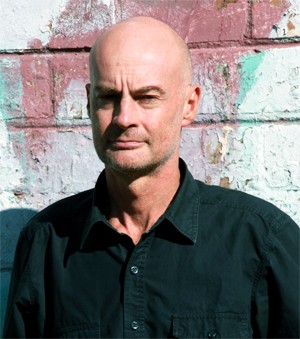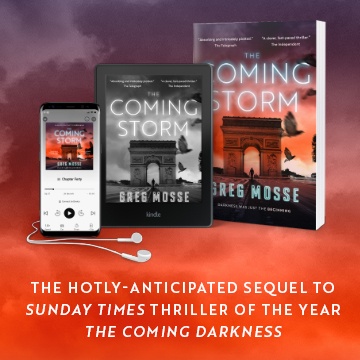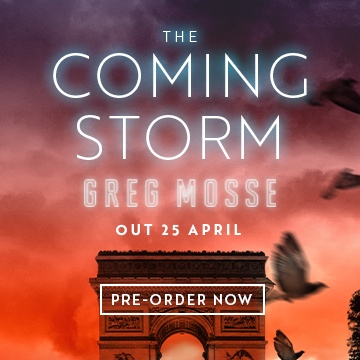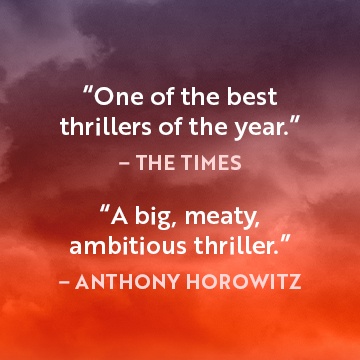 When it comes to crime fiction from southern Africa, what have you got? Well, at the one end of the spectrum there’s Alexander McCall Smith whose books deal in a light and amusing way with topics like manners and decorum, and the occasional proclivities of Botswana’s kindly folk. And there’s a touch of crime mixed in. Then at the other end there’s the work of Roger Smith where nobody would blink at a proclivity or bad habit. There’s blood and brutality on nearly every page as he writes about South Africa’s oppressive crime and violence. Good or bad, his characters do well just to survive, and if they take anything from their experiences other than their lives, that’s a real bonus. His first three novels – Wake Up Dead, Mixed Blood and Dust Devils – each packed a lot of punch, but he reckons his latest, Capture, is his darkest yet. It opens with the death of a small girl… We invited him to Crime Fiction Lover to tell us more about it.
When it comes to crime fiction from southern Africa, what have you got? Well, at the one end of the spectrum there’s Alexander McCall Smith whose books deal in a light and amusing way with topics like manners and decorum, and the occasional proclivities of Botswana’s kindly folk. And there’s a touch of crime mixed in. Then at the other end there’s the work of Roger Smith where nobody would blink at a proclivity or bad habit. There’s blood and brutality on nearly every page as he writes about South Africa’s oppressive crime and violence. Good or bad, his characters do well just to survive, and if they take anything from their experiences other than their lives, that’s a real bonus. His first three novels – Wake Up Dead, Mixed Blood and Dust Devils – each packed a lot of punch, but he reckons his latest, Capture, is his darkest yet. It opens with the death of a small girl… We invited him to Crime Fiction Lover to tell us more about it.
I read somewhere that you are in Thailand now. Have you left South Africa behind?
As fascinating as South Africa is, it is also a very demanding place to live, so my wife and I have been travelling a bit, taking a sabbatical in South East Asia. Getting some distance and perspective is always good.
What can crime fiction lovers expect from Capture?
Drugs. Sex. Violence. Obsession. Murder. Does that whet the appetite? My one-liner for the books is, ‘The truth is just the lie you believe the most’ which, I think, hints at characters who find themselves in increasingly complex – and dangerous – moral dilemmas.
You like exploring both morals and base survival through your characters. And thus we can see the dark side of human nature quite a bit. Tell me a little more about how this will unfold in Capture?
South Africa encourages a certain moral elasticity. Given that the ex-commissioner of police was jailed for 15 years for corruption and gangsterism and his successor was recently fired for similar transgressions, a loss of faith in law and order is understandable. And the culture of savagery in South Africa allows some people to forgive themselves their own criminal actions, like the three main characters in Capture, who find themselves capable of increasingly toxic and violent behaviour. It is my darkest book so far.
In South Africa race, politics, cultural prejudices, and wealth and poverty create such a complex backdrop. For you, what are the most challenging things about writing stories set there?
I was invited to the Quais du Polar crime fiction festival in France last year and was on a panel with David Peace and a trio of French crime writers who writers placed themselves and their work at the centre of political and social debate, and made no bones about the fact that if a crime writer dodges socio-political issues, he’s copping out. I am in complete agreement with that, and I try to tell entertaining stories that give an insight into the complexity of post-apartheid South Africa.
Is there a difference between how your books are received inside and outside South Africa?
For a while my books were better received internationally, where I have been lucky enough to be published in seven countries and receive excellent reviews. Fortunately this has changed, and lately I’ve been very well reviewed in South Africa, with a particular emphasis on how authentic my books are to South Africa readers.
One thing that’s ironic about the current popularity of Scandinavian crime fiction is that Nordic society is, in general, very peaceful and law abiding. South Africa, on the other hand, has real problems with crime. So how popular is crime fiction over there and what are your reflections on the irony I just mentioned?
I’ve said – only a little facetiously – that more people die on the pages of Swedish crime novels each year than on the streets of Stockholm. Very different in South Africa, where crime, particularly violent crime, is epidemic. So, I suppose you can say that Scandinavian crime writers have the freedom of being fantasists.
South Africans do read crime fiction about their own country, but I can understand if they are happier reading escapist romps playing out in Paris or Miami or Copenhagen.
My crime fiction will be about South Africa for the foreseeable future, but I have written a horror novel, under an alias, that is set in an imaginary America.
What’s next?
Another South African thriller called Sacrifices. The one-liner: ‘When the bad guy is you.’ For the first time I haven’t created a villain, just two people at war with the darkness in themselves. Interesting to write.
US readers can buy Capture here. It’s not out in the UK until February 2013. It will be available in South Africa and other Commonwealth countries soon through Serpent’s Tail.









The comment “if a crime writer dodges socio-political issues, he’s copping out” is an eye-opener. Are there any crime writers who do cop out?
Funny you should say that. I went to a panel discussion at CrimeFest in Bristol earlier this year. The topic was Crime Fiction – Social Commentary or Entertainment. None of the writers on the panel really wanted to admit to using it as a medium for social commentary. I was disappointed as they ended up discussing… well… not much.
I can’t think of a writer who hasn’t made social commentary, though I’m sure you’re more widely read than I. Maybe they want to remain subtle about it. Ordinary people avoid religion and politics as topics because they don’t want to offend. However, crime is a social issue which you surely cannot avoid as a writer.
I never read her, but maybe Agatha Christie is one of the few who avoided the issue? Watching the odd show on TV it seems class was an issue she explored a little, so even she was not exempt.
Thanks so much for sharing the great interview! I was introduced to Roger Smith’s work a few months ago. The man is brilliant. I finished Dust Devils and then bought Ishmael Toffee that same night. He easily became one of my top three favorite authors. It was great to learn a bit more about him!!